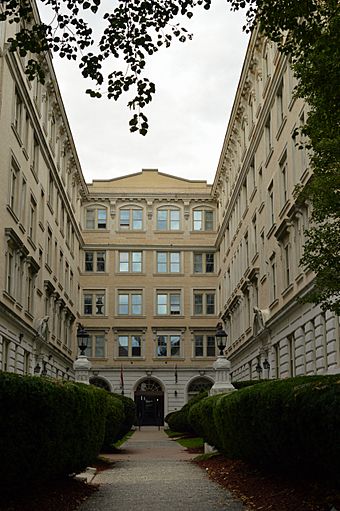Ambassador Apartments (Hartford, Connecticut) facts for kids
Quick facts for kids |
|
|
Ambassador Apartments
|
|
 |
|
| Location | 206-210 Farmington Ave., Hartford, Connecticut |
|---|---|
| Area | less than one acre |
| Built | 1917 |
| Architect | Berenson and Moses |
| Architectural style | Renaissance |
| NRHP reference No. | 08000859 |
| Added to NRHP | October 15, 2008 |
The Ambassador Apartments are a historic apartment building located in Hartford, Connecticut. This building is a great example of a classic architectural style called Renaissance Revival. It was finished in 1921 and designed by a well-known local architecture firm, Berenson and Moses. Because of its importance and unique design, the Ambassador Apartments were added to the National Register of Historic Places in 2008.
About the Building
The Ambassador Apartments are found in Hartford's Asylum Hill neighborhood. This area is just west of the city's downtown. The building is large and shaped like the letter "H". It stands five stories tall.
Building Design
The outside of the building is made of strong brick and stone walls. The corners of the front of the building have special brick columns with stone tops. A decorative metal trim runs along the roofline.
The ground floor looks like a raised basement. It has stone bands between its rectangular windows. The main entrances are grand, with rounded arches. These entrances lead into the courtyard between the building's wings. The windows on the second floor have decorative brackets and sills.
A Look Back in Time
The Ambassador Apartments were built between 1917 and 1921. They were designed by the famous local architects Berenson and Moses. Before the apartments were built, this land was part of a large mansion estate. It belonged to Pliny Jewell, who owned a local company that made belts.
When the apartments were first built, they were very modern. They had 128 apartments with all the newest features. There was even a parking garage for residents' cars! The building also had a large dining hall that could seat 300 people.
In 1920, a fire damaged the northeast part of the building. Luckily, special firewalls helped stop the fire from spreading too much. However, this fire did delay the completion of the entire building.
The first owner, Nicolo Carabillo, faced financial challenges. He ended up selling the building in 1925. By the 1970s, the building had lost some of its original charm. The Aetna Insurance Company, whose main office is nearby, bought the building. Aetna later sold the building in 1999 after making many improvements to the apartments.
See Also



